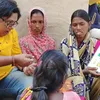Cisco launches Agri Challenge to enable the agritech startup ecosystem in India
The Cisco Agri Challenge, which has a prize purse of Rs 2 crore, will work with startups for 12 months to find innovations for the agritech sector and community.
The/Nudge Centre for Social Innovation, in association with the government of India, is organising the 'Cisco Agri Challenge'. This programme is looking for agritech startups to innovate and find solutions for 10 million small farmers.
With a prize purse of Rs 2 crore, the challenge will run in stages for 12 months. It is aimed at helping startups develop, test, and scale solutions. The objective is to alleviate the issues of low incomes and diminishing profitability of farming in India.
Prof K VijayRaghavan, Principal Scientific Adviser to the government of India, who is co-hosting the challenge, said, "The government of India strongly believes that public investment in both traditional science and frontier technology will empower India to leapfrog in developing sustainable solutions for biodiversity preservation, environmental sciences, climate change, and regenerative agriculture.”
He added that this “multi-disciplinary and multi-stakeholder collaboration will play a catalytic role in implementing scientific and technological interventions in agriculture”. This, in turn, will improve farmers’ productivity and double their income.
“It will give way to a new behaviour of seamless collaboration amongst the government, academia, and industry for addressing global societal problems,” said Vijay Raghavan.
The key in India is for small and marginal farmers, to rise in order to contribute to the economic welfare of India.
Harish Krishnan, Managing Director, Public Affairs and Strategic Engagements, Cisco India and SAARC, said, "Farmers are a critical part of India's socio-economic fabric, but they continue to face the challenge of low profitability, exacerbated by the pandemic. Through the Cisco Agri Challenge platform, we aim to accelerate digital transformation in the agriculture sector.”
He added that this is not only aimed at incubating agritech startups, but also bringing together a powerful ecosystem of investors, domain experts, and government stakeholders to “galvanise action and bring to market scalable solutions that can help boost farmers' incomes and improve their decision-making”.

The Cisco Agri Challenge draws talent, technology, capital, and attention to the most pressing land, crop, infrastructure, market fulfilment, and social protection issues of small farmers, spurred by the pandemic. There is an urgent need to bring together resources and action to address population-scale challenges for the agriculture sector, which is the backbone of India.
Atul Satija – CEO, The/Nudge Foundation, said, "Our aim is to scale innovation for income growth of small farmers. This will axiomatically augment GVA and the rural economy. Small technological advantages can lead to an inordinate impact on agricultural livelihood. We're leveraging public-private partnerships to achieve big shifts."
The conceptualisation and management of the Cisco Agri Challenge will be done by The/Nudge Centre for Social Innovation.
Participants will be mentored by an eminent circle of partners and experts like Mark Kahn (Managing Partner, ), Anil Kumar SG (Founder and CEO, ), Samit Ghosh (Founder, Ujjivan), and Shamika Ravi (Non-resident Senior Fellow, Brookings Institution).
The programme’s knowledge and technology partners include NSRCEL, IIM-Bangalore, Purdue University, and Sattva Consulting.
Other investors include Bharat Innovation Fund, Aavishkaar Capital, and Menterra. The Cisco Agri Challenge’s partners include the AgHub, Professor Jayashankar Telangana State Agricultural University (PJTSAU), and Nagaraja Prakasam.
It will also have a policy circle, which will enable access to administrative units and communities for pilots.
Edited by Saheli Sen Gupta








